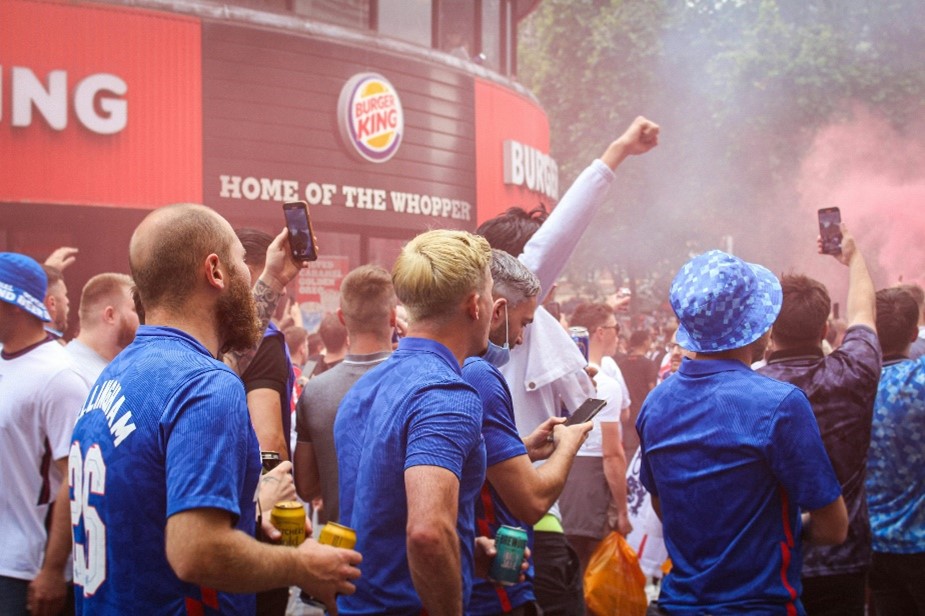The word “sustainability” has become so prevalent nowadays, that it has become a buzzword with many meanings and depths. In the eyes of the world’s governments, it’s a political platform serving as a place to promote their values to influence their voters. For environmental groups, it’s an ethos and a way to see the world holistically, ensuring our actions serve not only us now, but also future generations. And for brands? Well, this is where it gets complicated. Some see it as the only way forward and others – as a CSR exercise to give their consumers the notion that they care about the planet.
Where it gets even more interesting, however, is in sport and specifically, in sport sponsorship and activation. Sports organisations and sports personalities are becoming increasingly socially aware and politically involved; think of the Premier League’s fantastic efforts in continuing to support the players in taking a knee for Black Lives Matter, Lewis Hamilton’s T-Shirt in support of Breonna Taylor and more recently, Sebastian Vettel donning a rainbow T-shirt with the words “SAME LOVE” on it, complete with rainbow-embellished shoes, at the Hungarian GP.
This gives rights holders the opportunity to stand with the organisations they sponsor and get behind important causes, the key one of which is sustainability. Sponsorship gives brands a phenomenal platform to reach and influence millions of customers, and to take their relationship to the goods and products they produce from transactional to emotional.
With F1 World Champion and inaugural Extreme E team owner Nico Rosberg recently calling on sport to do more in terms of having a purpose[i], and the recent COP26 summit seeing a true mobilisation of the sports sector in the area of sustainability, we take a closer look at what various sports are already doing in the sustainability area, analysing why that matters for their communication strategies and whether the recent COP26 summit brought about any change in the area.
The below is an excerpt from a wider analysis, which gives more examples of sports disciplines, initiatives and sponsors involved in sustainability, as well as giving an insight into a sustainable, sport-focused…city. The full article is available here.
Formula 1
Perhaps counterintuitively, Formula 1 is determined to decrease its environmental impact. To meet the plan to have net zero carbon emissions by 2030[ii], Formula 1 continues to innovate and introduce numerous initiatives to do so.
So where do the sponsors come in? To start with, Aston Martin’s newest driver, Sebastian Vettel, sported a helmet with a very important “Change the world, sip by sip” sustainability message, supported by team sponsor Best Water Technology. Vettel has chosen the message to highlight the CO2 emissions caused by the transport and use of disposable plastic bottles. The German and the team sponsor now work together to create ‘bottle free zones’ in schools and nurseries, promoting sustainable drinking water and spreading the sustainability message[iii].
Formula E
New, innovative racing formats are becoming increasingly popular with drivers and fans alike. Formula E, has catalysed the attention of manufacturers, investors, sponsors, and stakeholders quite rapidly, taking the role of the “next big thing” of sponsorship in motor and other sports. In September 2020, the ABB FIA Formula E World Championship became the first global sport to be certified with a net zero carbon footprint from inception. This was achieved through investing in certified climate-protecting projects in all race markets to offset emissions from all six seasons of electric racing. In September, Formula E became the first sport to join the Science Based Targets initiative to tackle global warming[iv].
By aligning itself with Formula E as the title sponsor, technology company ABB has infinite possibilities to showcase their technological solutions. For each E-Prix, ABB’s invited guests are immersed in the action from the track and the surrounding race activities in a holistic 3D experience on sustainability, mobility, and energy efficiency. Shifting the race location to everybody’s home – throughout the season. The immersive virtual race experience allows ABB to share the Formula E experience even when races are held behind closed doors – with full branding, of course.
Football
According to a recent study entitled Sweat Not Oil, football has come out as one of the culprits of high carbon sponsorship[v]. With a plethora of car makers, fossil fuel companies and airlines in the sponsorship line-up (250 prominent partnerships across a variety of sports and 57 in football alone, to be exact), it is no surprise that football clubs are not seen as the pioneers of sustainability in sport.
An increasing number of clubs is doing things differently. In some cases, very differently. English League 2 club Forest Green Rovers is a prime example of its owner’s eco-ethos. The Club’s home stadium is powered by 100% green energy and the match-day food is fully vegan. Sustainability transcends the club in every area of its existence, including the sponsorships they hold – from Quorn Foods, market leader in sustainable protein which are served at the stadium[vi]; through innocent Drinks who have vowed to plant 50 trees for every professional football game in the UK that ‘nets zero’ and finishes 0-0[vii], to the side’s kit, which is partly made of coffee waste and recyclable plastic bottles – everything in them is recycled or organic.
Quorn’s sponsorship must have reached the desired result and given them a hunger for more, as in 2020 the brand became Liverpool FC’s Official Sustainable Protein Partner[viii], with the sponsorship aiming to contribute to greater food sustainability within the club – and of course, its fanbase. The partnership based around sustainability seems to be working for the club, as they have recently taken on SC Johnson (producers of Mr Muscle)[ix] as their official cleaning and disinfectant partner.
Football has a long way to go yet, but the above partnerships and initiatives demonstrate a growing awareness of the needs of their sponsors’ customers, reflected in the commercial choices the clubs will need to make going forward.
Rugby
The recently postponed Rugby League World Cup 2021 pioneered the notion of sustainability being a crucial part of a modern-day sporting event on a mass scale. To highlight its commitment to placing sustainability as a key priority on the agenda, RLWC2021 unveiled a sustainability charter, the essence of which is best described by RLWC2021’s Chief Executive, Jon Dutton: “If we do not keep sustainability high up on the agenda, the future will very soon be the present.”[x]
The event’s sponsors bought into the charter and have taken activating it further. Official Logistics Partner, Kuehne+Nagel, announced a new tournament time campaign this June (prior to the tournament being postponed), named ‘Tree for a Try’[xi]; to further support the tournament’s commitment to delivering the most sustainable Rugby League World Cup ever.
Kuehne+Nagel pledged to plant a tree for every try scored in all 61 matches across the Men’s, Women’s, and Wheelchair tournaments as part of their ongoing sustainability goals.
The impact of COP26
Representatives of the United Nations, the International Olympic Committee (IOC) and the Paris 2024 Organising Committee of the Olympic and Paralympic Games spoke out at COP26 in Glasgow to highlight sport’s capacity for action on climate change[xii].
The speakers were all involved in the Sports for Climate Action Framework, which was launched at COP24 Katowice in 2018 as a collaboration between the United Nations Framework Convention on Climate Change (UNFCCC)[xiii] and sports organisations from all over the world.
“Sport has a big climate footprint,” Niclas Svenningsen, Manager for the Global Climate Action team at UNFCCC told delegates at COP26 in Glasgow.
“But sport also has a huge power to influence. “Not everyone might have a favourite politician, but everyone has a favourite athlete or club,” he pointed out. (…) “We want to promote sustainable consumption and advocate more climate action towards athletes, fans, suppliers and everyone else.”[xiv]
The summit brought sustainability in sport and sport sponsorship to the fore in a way that has not been done before, highlighting how sporting events and entities can shine a light on climate change. This allows sports sponsors to not only get involved in the discussion, but also take steps towards real change, in turn engaging with their audiences in a meaningful way.
I am a rights holder. How can I activate my sponsorship more sustainability?
The above gives a brief overview of how various sports and their sponsors are approaching the topic of sustainability, and how it is already impacting the public perception of their brands. For a quick answer to the above questions, the UK Sponsorship Awards offer some tips which can serve as a starting point for a sustainable sponsorship[xv].
However, ensuring that as a rights holder you utilise the tools of your sponsorship activation to maximise return on investment to the business while generating brand awareness and increasing positive sentiment is a fine balance.
Which is why sponsorship activation agencies with a holistic view of the marketing mix, focusing on the importance of social and traditional media communication, are the key to commercial success. Here at Hatch, we have a plethora of sponsorship activation experience, from amplifying charitable partnerships and projects to creating sustainable charters. Have a look at our case studies and get in touch to see how your brand could benefit from our services.
Appendix
[i] BBC Sport, “Extreme E: Nico Rosberg says sport must have a purpose”
[ii] Formula1, “Formula 1 announces plan to be Net Zero Carbon by 2030”
[iii] Formula1, “Change the world, sip by sip’ – Vettel reveals new helmet promoting sustainability”
[iv] FIA Formula E, “Formula E becomes first sport to join Science Based Targets initiative to tackle global warming”
[v] Cyprus Mail, “Sport floating on sea of high-carbon sponsorship”
[vi] Quorn, “Quorn Extends Forest Green Rovers relationship into fifth season”
[vii] Forest Green Rovers, “Innocent to plant 50 trees for every 0-0 in the UK this season”
[viii] Sport Business, “Liverpool increases sustainable food focus with Quorn deal”
[ix] SportsPro, “Liverpool team with SC Johnson to promote sustainability”
[x] Rugby League World Cup, “Sustainability Strategy”
[xi] Kuehne+Nagel, “Kuehne+Nagel announce ‘Tree for a Try’ at Rugby League World Cup 2021”
[xii] Host City, “Sport takes climate action at COP26”
[xiii] UNFCCC, “Sports for Climate Action”
[xiv] Ibidem.
[xv] The UK Sponsorship Awards, “Top Tips For a Sustainable Sponsorship”





